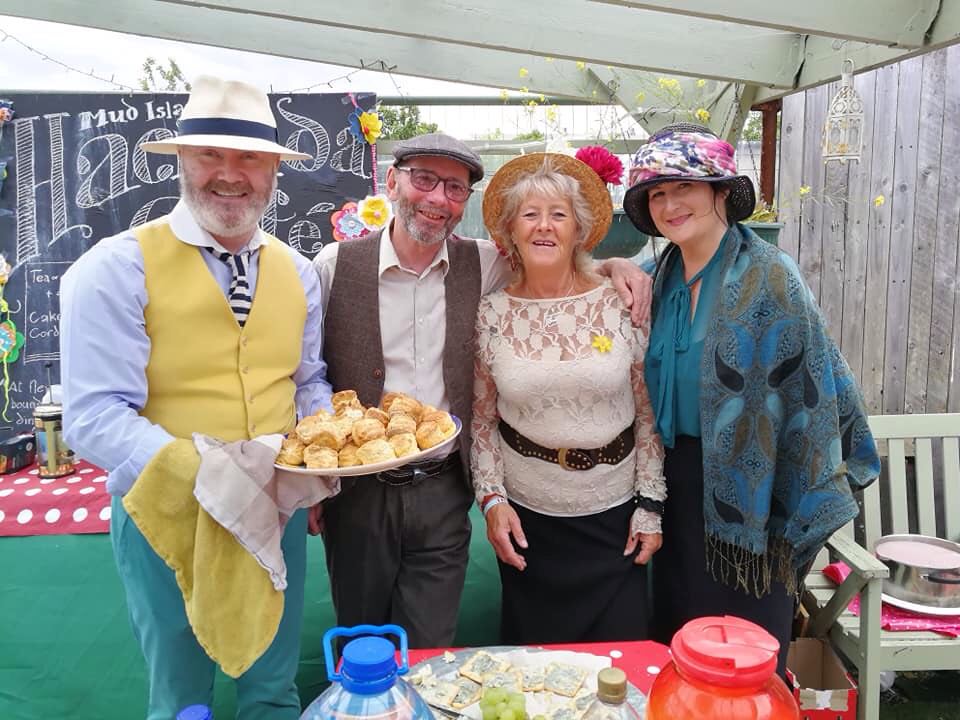In nature there is no such thing as waste! Permaculture is a discipline and skill set offering new and exciting ways to be part of the solution in to the many challenges facing our world today. Hannah Mole is a passionate permaculture enthusiast and teacher on the Permaculture Design Course(PDC) at Carraig Dúlra county Wicklow. She is reaching out to you, our seniors and elders, keen to explore how your wisdom and experience can enrich the fabric of nature-care in Ireland. Here she extends a hearty invitation to you to come and participate in and complete a Permaculture Design Course at Carraig Dúlra in County Wicklow, 21st July until the 3rd August.
(Mary Kennedy second from right)
“It is so important now that we get it right for our future generations. We can all make small changes, we just have to learn which changes to make… The PDC course can help you to see things much more clearly”
Mary Kennedy, a graduate of the Permaculture Design Course, (at the age of 65).
What is Permaculture?
Permaculture Design is drawn from deep and lengthy observations of modern culture, patterns in nature, ecological science, indigenous knowledge and innovation thinking.
From this it offers us a holistic, design-centered approach to developing our culture, from personal, to local, to global. A culture that is not only sustainable, but regenerative. A culture and the practices that provides us with the resources that we need locally and ecologically and distributes them equitably.
It is directly founded upon three ethics
- Earthcare,
- People Care
- and Fair share
“Permaculture as a design system contains nothing new. It arranges what was always there in a different way, so that it works to conserve energy or to generate more energy than it consumes, What is novel, and often overlooked, is that any system of total common-sense design for human communities is revolutionary!”
Bill Mollisson
The Beginnings
In Southern Australia in the early 1970’s, two ecologists Bill Mollison and David Holmgren saw that by applying the principles of ecology to the way that we tend to the land – garden, grow food, farm, rehabilitate degraded landscapes – we could produce more food, more resources and less waste and pollution than in our current systems. Of course, in nature there is no such thing as ‘waste’!
From this insight, they developed a complete ecological design system of ideas, techniques and strategies called ‘Permaculture’ that can be applied within any discipline.
Over the ensuing 30 years, and in all climates, countless practitioners, students and teachers have contributed to and evolved this ‘open source’ design approach to creating better systems for people and planet.
The Permaculture Design Course at Carraig Dúlra
The Permaculture Design Course (PDC) is typically a two-week intensive onsite learning adventure, was originally designed to encompass “everything `that it takes to create a sustainable and future human settlements” and cultures.
It is as much a change in mindset and how we see things -a way of thinking as it is a practical skillset.
At Carraig Dúlra we have honed and crafted our Permaculture Design Certificate course into a truly transformational education experience.
But, what are we trying to transform? Well, it’s primarily about a way of thinking that informs how we design every aspect of our lives.
To move away from linear, limited actions that lead to us being wasteful of finite resources, fossil fuels, water, soil and also our own energies and the waste of human lives in a globally unjust system.
To move towards an ecological and creative way of seeing the world and us humans in it. Towards abundant, circular systems within which everyone has more opportunity to find their niche. Towards systems that ‘create forests, create soils, clean energies, secure communities, and stable regions’ Mollisson
The key principles that need to be learned are from the core curriculum of the internationally recognised permaculture design certificate course, but really also come from an experience of living and experiencing them fully in a hands-on, active, supported community of learning.
This helps our learners transform their thinking and gain the new skills necessary to carry out the changes that come from their new mindset.
How we do this at Carriag Dúlra
The Carraig Dúlra PDC has people care and a deep understanding of diverse learner needs at its core. The diversity in the group comes from age, nationality, culture, backgrounds, education, language, gender and experience, and this informs the richness of our course ecosystem.
This approach takes into account both individual learning journeys and a collaborative group culture using active and reflective learning and a designed immersive learning environment.
During the course, we use a diversity of teaching and learning methods: observation, reflection and analysis, practice, peer to peer work, supportive guidance, and mentorship from experienced teachers.
This year we have 14 teachers, permaculture practitioners from across Ireland contributing to the course over the two weeks, so we have expertise on water, soils, plants and gardens, local and global community development, woodlands, farming, natural systems, and more…
It is always lively, interactive, learner-led, community based, innovative and fun!
Course Details
This year’s course runs from 21st July until the 3rd August, and is residential onsite at Carraig Dúlra, Country Wicklow.
We would be delighted to welcome you on board and we appreciate the richness of what each and every person has to bring and share to the course. We are especially reaching out to the active retired groups with an awareness of intergenerational learning opportunities, the wisdom that is held within our older generations, and the magic that emerges from a diverse course eco-system!
For lots more information, course content, and bookings at www.dulra.org/courses
Or for more information please contact hannah@earthcare.ie or 0851969790.
Testimonials :
“I only encountered permaculture just before I did the permaculture design course in Carraig Dúlra a couple of years ago. I was 65 yrs old.
I actually saw the course advertised on Facebook and checked it out and decided this fit perfectly with my own ethos about gardening. After the course I learned more about permaculture by reading and attending the annual permaculture gathering where like-minded people meet to exchange skills.
The PDC course really opened my eyes to the necessity of working with nature even if you don’t own a lot of land. I can’t say I’ve really used permaculture in a huge way since the course, but it has certainly changed the way I think about mother nature and how we must work and grow in harmony with her.
I have tried to bring this into our community garden in the North Inner City in Dublin where we grow organic vegetables without using any harmful products and encouraging our members to plant bee friendly plants in their gardens.
What I would say to anyone thinking about exploring permaculture is definitely give it a try. It is so important now that we get it right for our future generations. We can all make small changes, we just have to learn which changes to make… The PDC course can help you to see things much more clearly.”
Mary Kennedy, PDC graduate, Co. Dublin,
“ I grew up with a small suburban garden in west Dublin where I always dreamed of having a small holding. In the late seventies I subscribed to a magazine called ‘Common Ground’ and this was where I first encountered the term permaculture. I never saw permaculture as simply a ‘gardening thing’, but rather a template for a gentle footprint on the planet. The book which first captured my imagination was John Seymour’s ‘self sufficiency’ manual.
Doing the PDCc course was the real awaking for me, my formal training was in amenity horticulture, so I had a lot of unlearning to do. The tutors had a slower paced view of the landscape than I. Taking time to absorb the surroundings was new to me. I came back home fired up in a gentle way! I built a dry toilet, grew fewer exotics and more veg, and gardening became more relaxed. Permaculture is not an excuse for doing nothing but a reason for doing things differently”
Brendan Little, PDC graduate, Co Donegal



